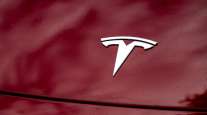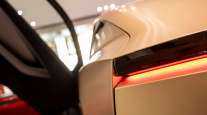Tesla’s RoboTaxi Worth a Fraction of Waymo, Morgan Stanley Says

Tesla has let more than a few investors down of late, and one part of the company hasn’t quite lived up to expectations at Morgan Stanley either.
Tesla Mobility, the carmaker’s ride sharing/robo-taxi business, is worth about $17.7 billion or about $95 per Tesla share, analyst Adam Jonas wrote in a note to clients Sept. 4. That’s about one tenth of Waymo’s value, he said. The same analyst predicted the service could be worth as much as $244 a share in 2015. At the time, he had a $465 price target on Tesla, compared with his current target of $291.
RELATED: Tesla Class 8 prototype crosses country, stops at Ruan
RELATED: Tesla’s cobalt-light batteries seen providing cost advantage
“Most investors we speak with do not explicitly include any valuation for this market opportunity, citing a lack of transparency from the company and a willingness to wait until an announcement of a fleeting of vehicles on public roads,” Jonas wrote, noting that in the meantime, developments at Waymo and GM Cruise are “progressing in earnest on both commercial and capital formation fronts.”
Tesla has a higher cost of capital compared with Alphabet/Waymo. It also has less room for revenue monetization, since a rival “megatech platform” could have a far greater degree of pricing and competitive flexibility, and could monetize consumer data through a number of different verticals potentially not available to the electric vehicle manufacturer.
Tesla shares were down as much as 3.1% Sept. 4, extending their decline to a sixth straight session, in its longest losing streak since March, thanks to Elon Musk’s go-private-or-not saga that ended the evening of Aug. 24. Goldman Sachs, which was said to be advising the company and had restricted its coverage of the stock, also reinstated its sell rating on Tesla earlier Sept. 4.
Tesla’s competition is significant: General Motors Co.’s Cruise autonomous-vehicle unit earned a vote of investor confidence earlier this year when Japan’s SoftBank Vision Fund said it would invest $2.25 billion in the business. And just last week, Toyota Motor Corp. said it would put $500 million more in Uber Technologies Inc., in an effort to catch up in the race against GM and Waymo.
And then there’s Mercedes, which Sept. 4 announced the rollout of battery-powered models, a $12 billion attack that’s adding to a growing array of high-end brands targeting Tesla.




